English : Term 1 Unit 2 : Prose : When the Trees Walked
WARM UP
Look at the picture.
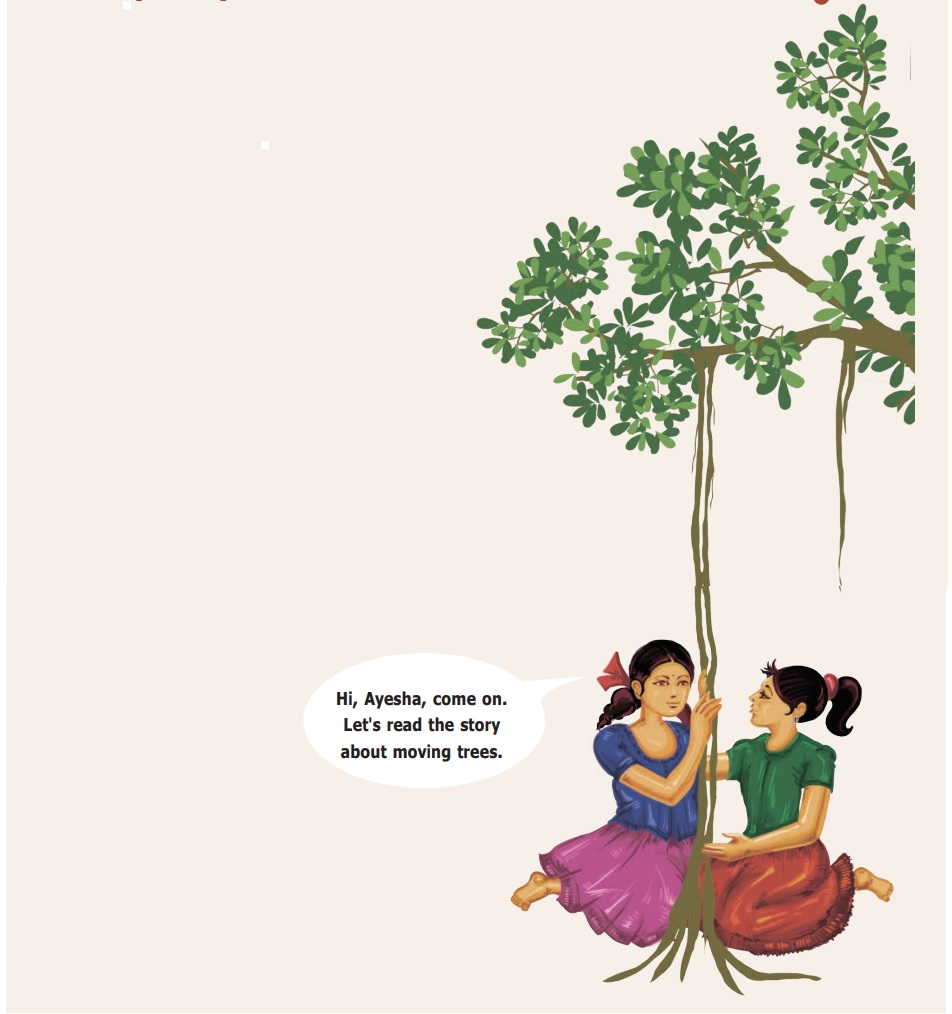
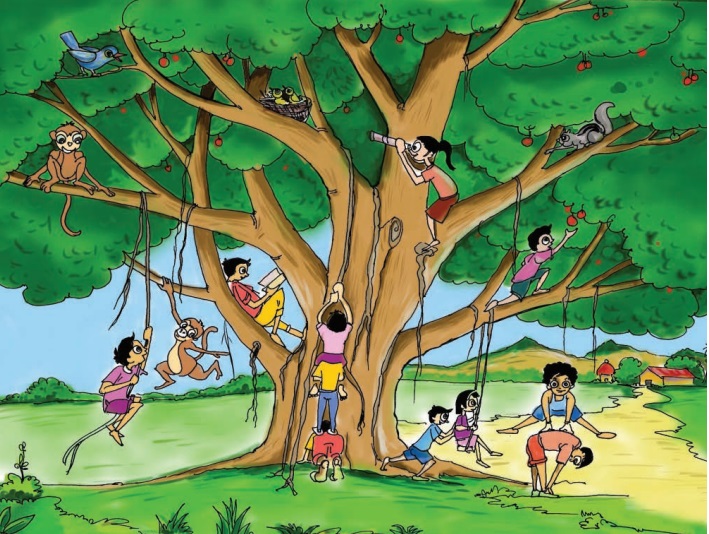
A. Describe the picture.
You can begin like this:
This picture is about … This picture is about a tree. It shows the enjoyment of children playing under the tree.
In this picture we can see … few boys playing, a girl looking through the binocular, boys climbing one above the other two boys are playing swing, one boy is reading a boy in the swing a bird squirrel a monkey and a boys plucking fruit from the tree.
There are … birds, monkey, squirrel in the tree
B. Discuss and answer.
1. What are the children doing? Describe their activities.
The children are playing. Few boys are climing one above the other, two boys are jumping, few boys are in the swing, a girl is with a binocular, one boy is reading a book and one boy is plucking the fruit.
2. Would you like to be in their place? If so what would you enjoy the most?
Yes, I would like to be in that place. I would enjoy swing the most happy.
Section I
Discuss and answer.
1. When did the garden become a happy place for the author ?
When author’s grandfather joined him the garden became the happy place for the author.
2. What are the two reasons the author gives for the plants moving towards grandfather?
Light and warmth.
3. Why does the writer think that the peepul tree is a great show off ?
Peepul tree are great show off, even when there is no breeze, their broad-chested, slim waisted leaves will spin like tops determined to attract one’s attention and invite into the shade.
GLOSSARY
fertile – able to produce a lot of plants or crops
abandoned – left without care
vigorous – healthy and strong
Section II
Discuss and answer.
1. Why do we need trees? List four reasons that Grandfather gives.
• To keep the desert away.
• To attract rain.
• To prevent the banks of rivers from being washed away.
• For fruit and flowers, leaf and seed.
2. Why did the author help his Grandfather plant trees?
The author accepted the fact that men needs trees, not only to improve view but for the animals and birds who live here and need more food and shelter.
3.What made Grandfather plant saplings on the rocky island?
The island was rocky in a river bed looking at a single small mango tree growing in the island grandfather decided to plant saplings. He thought that as soon as the rains set in and while rivers could still be crossed they could plant the saplings.
GLOSSARY
protested – opposed or disagreed
nightmare – a frightening dream
interfering – stopping
Section III
Discuss and answer.
1. What did Grandmother feel about trees growing in the house?
Grandmother did not mind trees but she preferred growing flowers.
2. Why did the author leave town?
Due to second world war the author had to leave the town to a boarding school.
3. How did Grandfather’s dream come true?
After many years later the author went to the riverbed and he saw the trees well grown, squirrels, koel, crow challenged the author with a mellow “who are you”. Thus the grandfather’s dream come true.
4. Describe what the author saw when he went back to the island.
After first visiting the old house which has not changed much the author walked out off the town towards the river bed. He looked the dry water course and was caught by the spectacular red blooms of the coral blossom. In contrast with the river bed, the island was a small green paradise. He noticed that some squirrels were living in them and a koel, a crow pheasant, challenged me with a mellow “Who are you?”
GLOSSARY
rambling – wandering
sprout – when seeds begin to grow small plants
spectacular – eye-catching
beckoned – to signal (someone) with your hand to ask the person to come closer or follow
READ AND UNDERSTAND
A. Tick the most appropriate option.
1. According to the author the tendril was moving towards grandfather because it
a. needed light and warmth.
b. did not like the light and warmth.
c. wanted to be near Grandfather.
d. wanted to escape from the winter.
2. Grandmother had wanted the peepul tree cut down because
a. she did not like trees.
b. she wanted to grow flowers.
c. it was an old tree.
d. it was knocking down the bricks of the outhouse.
3. Grandfather helped grandma out with the gardening because he
a. liked gardening.
b. wanted to grow flowers to attract butterflies.
c. wanted to beautify the garden.
d. wanted to make the house green.
4. The author did not want to plant saplings in the forest because
a. no one would come to see them.
b. it was dangerous to enter the forest.
c. it would not be of any use to them.
d. no one would appreciate them.
5. Grandfather felt planting trees would help the forest because
a. he wanted to make the view beautiful.
b. the river-bed was dry.
c. animals and birds in the forest would love him.
d. the animals and birds would find it easier to live.
6. When the author returned from England to Dehradun, he found Grandfather’s dream had come true because the
a. old house had changed.
b. river was full.
c. trees had red flowers.
d. forest covered the island.
B. Read the story on your own. Discuss in a group and complete the story map below.
A story map is the main events of the story given in a flow chart.
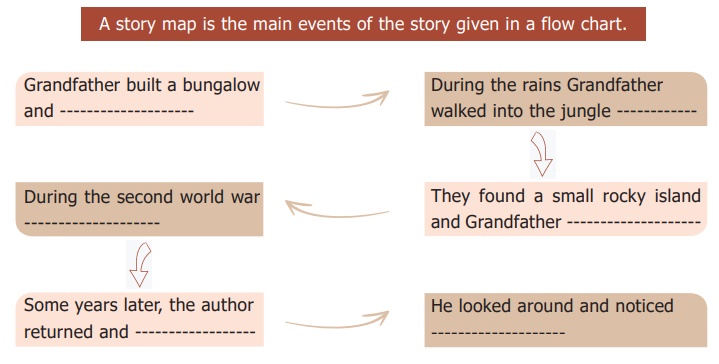
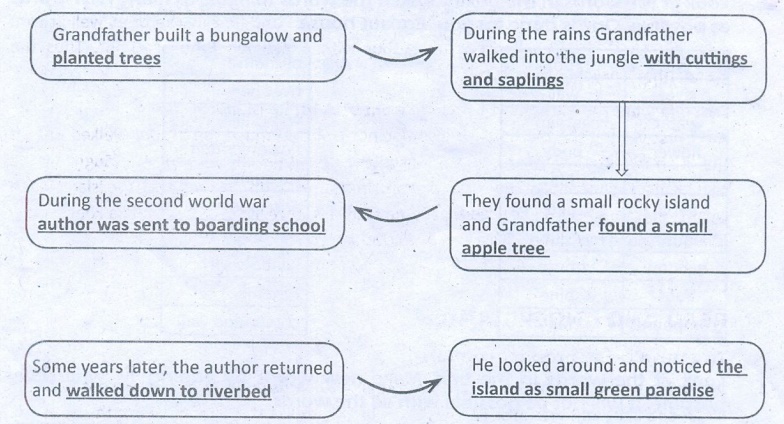
C. Work in groups of five. Tell the story in ten sentences.
You can begin the story like this:
The author’s Grandfather served in the Indian Forest Service.
After his retirement he built ————
Now continue the story. Each one should say one sentence.
1. The author’s grandfather served in the.India Forest Service.
2. After his retirement he built a bungalow on the outskirts of Dehradun.
3. He like planting trees.
4. Grandmother was interested in growing flowers.
5. Flowers will attract butterflies.
6. Grandfather used to go into the jungle beyond riverbed with cuttings and saplings
7. He liked to plant in the forest.
8. He planned such that the forest will help animals and birds to live happily with food and shelter.
9. second world war – author was sent to boarding school.
10. Many years later author came to see the riverbed it looked like a paradise.
D. Write a summary based on the story map.
LANGUAGE CHECK POINT
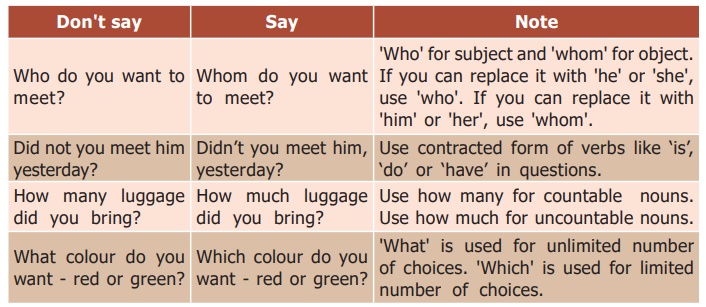
Don’t say: Who do you want to meet?
Say: Whom do you want to meet?
Note: ‘Who’ for subject and ‘whom’ for object. If you can replace it with ‘he’ or ‘she’, use ‘who’. If you can replace it with ‘him’ or ‘her’, use ‘whom’.
Don’t say: Did not you meet him yesterday?
Say: Didn’t you meet him, yesterday?
Note: Use contracted form of verbs like ‘is’, ‘do’ or ‘have’ in questions.
Don’t say: How many luggage did you bring?
Say: How much luggage did you bring?
Note: Use how many for countable nouns. Use how much for uncountable nouns.
Don’t say: What colour do you want – red or green?
Say: Which colour do you want – red or green?
Note: ‘What’ is used for unlimited number of choices. ‘Which’ is used for limited number of choices.
VOCABULARY
E. Look at the words in the boxes. Match the words to make as many new words as possible. One is done for you. Eg. out house.
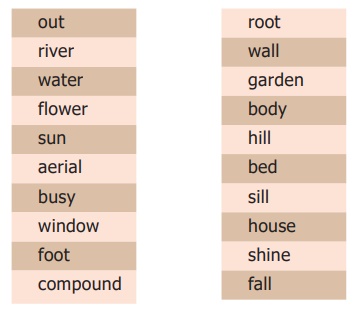
Answer:
outhouse
river bed
waterfall
flower garden
sunshine
areal root
busybody
window sill
foot hill
compound wall
F. Look at the words in the box. Make new words by adding ‘ly’ whereever possible. It will not be possible with all the words.
lone | blossom | fertile | vigorous | place | constant | complete | strong | unlike | great | cross | immediate | broad
Suffix : A letter or letters added at the end of a word to make a different or a new formof the word. Eg. lone+ly= lonely
Lonely
vigorously
constantly
completely
strongly
unlikely
greatly
Immediately
broadly
G. Look at the words in the box. Fill the wheel with their antonyms.
All the words begin with ‘S’ and are from the text.
hard | fat | weak | big | fast | hide | rough | dull
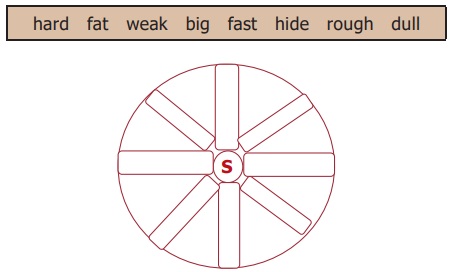
Answer:
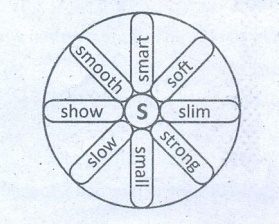
LISTENING
H. Listen to your teacher read out what happened to Nandhu. Some of the statements given below are correct. Tick them (✓).
Nandhu and the Lamp
One morning, as Nandhu was walking to school, a big truck went past him. The truck went over a bump in the road and a box fell down. The box broke open. The truck kept going and was soon gone.
Out of the broken box there fell a small brass lamp. It looked just like the magic lamp that was drawn in Nandhu’s storybook. It was small and made of brass. It had a handle and a cover. Nandhu wondered if this was a magic lamp too. He decided to take it home and try it out.
“Where did you get it?” said his mother, “It looks like a lamp.”
“It fell off a truck. Is it a magic lamp? It looks just like the one in the book,” said Nandhu. As he wiped the lamp, Nandhu noticed a small button on the side. When he pressed it a bright blue light came on and lit the whole room.
• The truck went over a stone. [×]
• The box fell out of a truck. [✓]
• The brass lamp was in the truck. [✓]
• Nandhu wanted to play with the lamp. [×]
• It was like the lamp Nandhu had at home. [×]
• Nandhu pressed a button. [✓]
SPEAKING
I. Take something from your school bag. Describe it in three sentences. Ask the class to find out the thing you have described.
• A written or printed work consisting of pages glued or sewn together along one side and bound in covers.Who am I? Books
• A small container for writing equipment. Who am i ? Pencil Box
• A device erasing marks made with pen, pencil, chalk etc. Who am I? Eraser
J. Discuss in groups of five. Make a story about the comic strip. Then share it in the class.
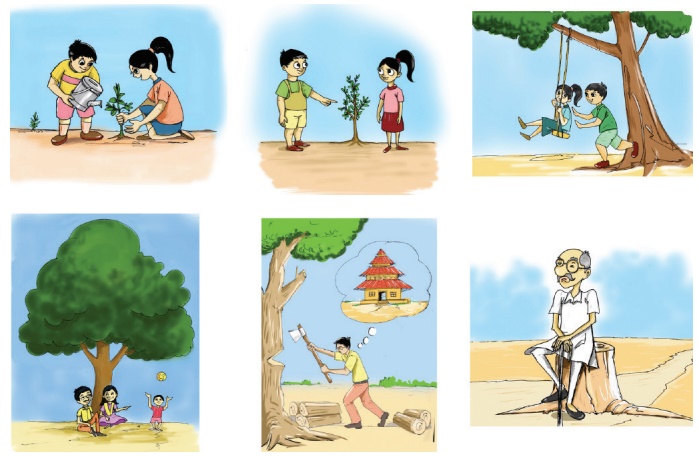
Answers:
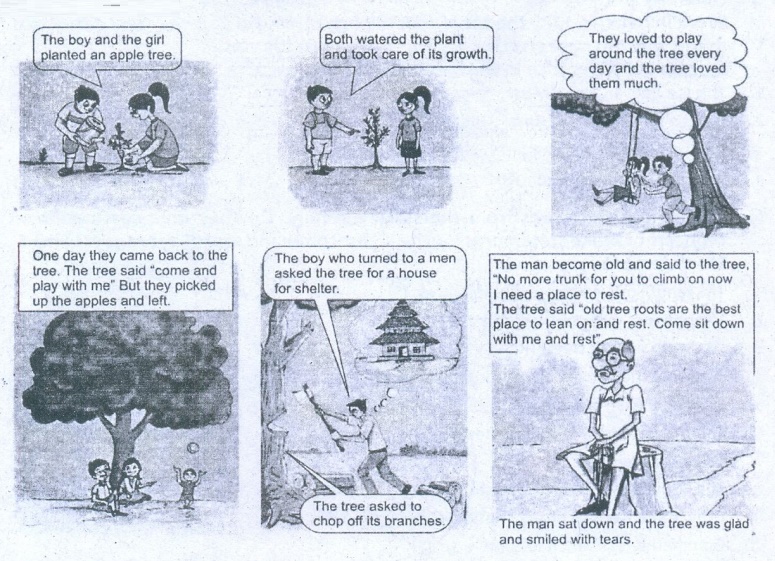
PICTO GRAMMAR
A sentence begins with a capital letter and ends with a full stop or a question mark or an exclamation mark.
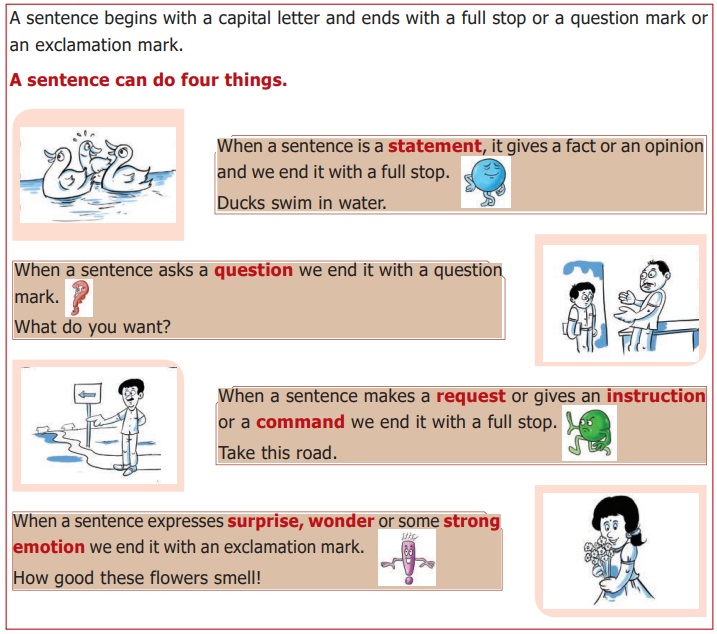
USE GRAMMAR
K. Tick the right option to fill in the blanks.
1. ___________ a beautiful flower!
a. How
b. Wow
c. What
d. Hurrah
2. ___________ play football?
a. You can
b. Can you
c. Have you
d. You could
3. ___________ did you go yesterday?
a. Which
b. Where
c. What
d. Who
4. ___________ us go for a walk.
a. Shall
b. May
c. Let
d. Can
5. ___________ like to play hide and seek.
a. He
b. She
c. I
d. Muthu
L. Look at the punctuation of these sentences. Why are they punctuated differently? Discuss in class.
1. One always felt like drawing close to him. → Statement (ends with full stop.)
2. But no one ever comes here! → Express emotion (exclamatory !)
3. Who’s going to see them? → Asking question (?)
4. Come here. → Command.
M. Work in pairs and say the sentences to each other. Do you hear any difference in the way it is spoken? Discuss and share with the class.
Discuss the difference in the meaning of the sentences.
1. This is a banyan tree. Answer: Statement
2. Is this a banyan tree? Answer: Question
3. What a beautiful banyan tree! Answer: Excalmation
4. Look at this banyan tree. Answer: Command
N. Read these sentences from the story carefully. Do they give commands or requests or make statements? Write ‘C’ for command and ‘R’ for request and ‘S’ for statement.
1. The tendril moved towards grandfather. [S]
2. I want a roof over my head. [C]
3. Please do not cut trees. [R]
4. We spent the whole day planting saplings. [S]
5. Will you please remove the trees growing on the wall? [R]
6. There was a forest on the island. [S]
7. Go to the river bed. [C]
8. The island was a green paradise. [S]
9. Grow more trees to protect nature. [C]
10. Grandfather’s dream had come true. [S]
WRITING
O. Look at the picture and write a paragraph using the clues in the picture.
GROW AND PROTECT TREES
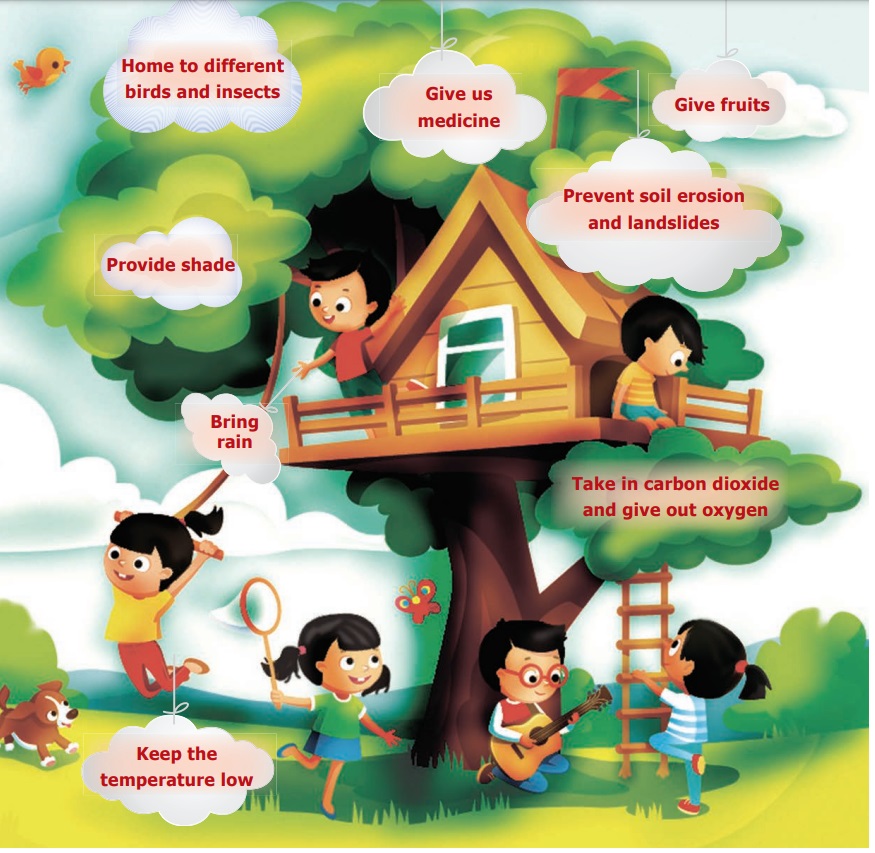
♦ Trees give us fruits. They prevent soil erosion and land slides.
♦ Trees take in carbondioxide and gives out oxygen.
♦ Trees bring rain.
♦ Trees keep the temperature of the surroundings low.
♦ Trees are the homes to different kinds of birds and insects.
♦ Trees provide shade.
♦ Trees gives us medicine.
CREATIVE WRITING
Look at the picture and write a story.
If you cut down trees
Your children will pay the fees
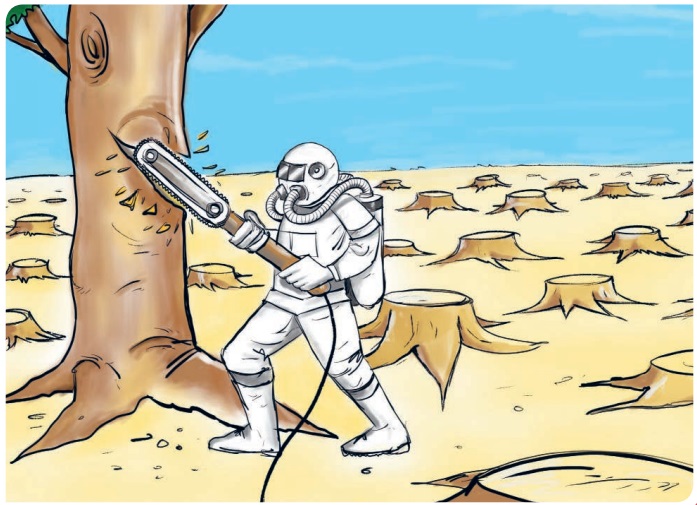
TITLE THE STORY OF THE WOOD CUTTER
Once upon a time, a very strong woodcutter asked for a job in a timber merchant and he got it. The pay was really good and so was the work condition. For those reasons, the woodcutter was determined to do his best.
His boss gave him an axe and showed him the area where he supposed to work.
The first day, the woodcutter brought 18 trees.
“Congratulations,” the boss said. “Go on that way!”
Very motivated by the boss words, the woodcutter tried harder the next day, but he could only bring 15 trees. The third day he tried even harder, but he could only bring 10 trees. Day after day he was bringing less and less trees.
“I must be losing my strength”, the woodcutter thought. He went to the boss and apologized, saying that he could not understand what was going on.
“When was the last time you sharpened your axe?” the boss asked.
“Sharpen? I had no time to sharpen my axe. I have been very busy trying to cut trees…”
Morel: Take time to think and relax















Our platform makes available various pharmaceuticals for home delivery.
You can easily buy needed prescriptions without leaving home.
Our inventory includes both common medications and specialty items.
All products is supplied through trusted pharmacies.
vidalista tadalafil
Our focus is on user protection, with data protection and timely service.
Whether you’re treating a cold, you’ll find what you need here.
Visit the store today and enjoy trusted support.